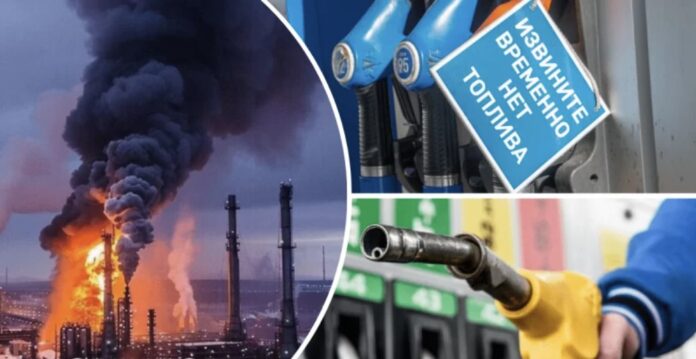У Росії спостерігається надзвичайна ситуація з постачанням бензину та дизеля, викликана частотою нападів безпілотників на нафтопереробні заводи. В результаті вичерпуються запаси палива, що призводить до різкого зростання цін на пальне у країні.
Все більше підприємств у Росії змушені припиняти виробництво бензину. Це призвело до збільшення цін: за останній тиждень ціни на дизель підскочили майже на 10%, а бензин досяг максимального рівня за останні півроку, зростаючи на 20%.
Напади українських безпілотників на нафтопереробні заводи в глибині Росії змусили кремлівські влади перейти до захисних заходів. Однак ці атаки призвели до надзвичайної ситуації: в Росії закінчився запас бензину. Навіть експорт палива зменшився майже до історичного мінімуму. Крім того, Росія скоротила постачання палива своїй армії в Україну.
Видання зазначило, що ця ситуація є серйозною проблемою для Росії як політично, так і економічно. Ціни на пальне швидко зростають, порушуючи обіцянки про дешеве паливо для населення, що є великим викликом для уряду.
Атаки безпілотників на сховища палива та нафтопереробні заводи в Росії продовжуються. 26 квітня дрон потрапив на Слов’янський нафтопереробний завод у Краснодарському краї, пошкодивши колону ректифікації. Інцидент призвів до пожежі, яка завдала шкоди інфраструктурі. На щастя, вдалося уникнути людських постраждань.
День раніше, в Омську сталася значна пожежа, яка поширилася на резервуари з паливом поблизу Омського нафтопереробного заводу. Початково площа загоряння становила 500 квадратних метрів, але з часом збільшилася до 1000 квадратних метрів.
У ніч на 20 квітня українські безпілотники здійснили масштабні атаки на територію Росії. Вони нанесли удари по нафтопереробних заводах та електропідстанціях у восьми областях РФ. Пожежі виникли на НПЗ у Смоленській області, а також було зафіксовано пошкодження електропідстанцій в інших регіонах.
Щоб захистити свої нафтопереробні заводи від атак дронів, російські компанії почали використовувати спеціальні сітки. Ці заходи призначені для зниження ризику ударів на початковій стадії.


